八年级英语unit9复习资料
人教版八年级英语上册unit 9知识点归纳
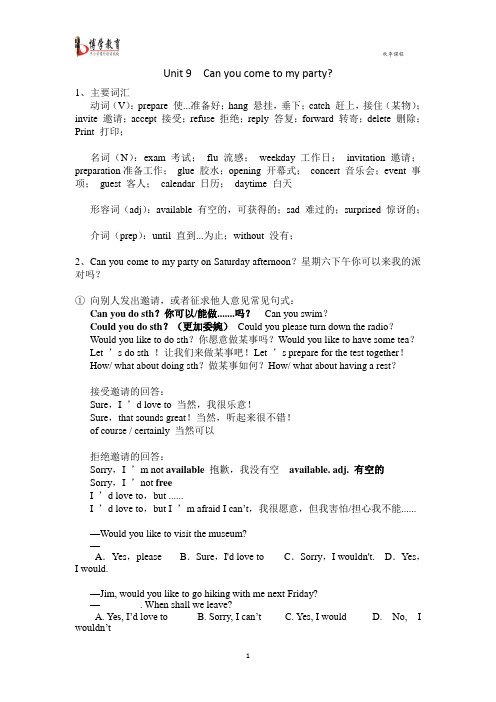
Unit 9 Can you come to my party?1、主要词汇动词(V):prepare 使...准备好;hang 悬挂,垂下;catch 赶上,接住(某物);invite 邀请;accept 接受;refuse 拒绝;reply 答复;forward 转寄;delete 删除;Print 打印;名词(N):exam考试;flu流感;weekday 工作日;invitation 邀请;preparation准备工作;glue 胶水;opening 开幕式;concert 音乐会;event 事项;guest 客人;calendar 日历;daytime 白天形容词(adj):available 有空的,可获得的;sad 难过的;surprised 惊讶的;介词(prep):until 直到...为止;without 没有;2、Can you come to my party on Saturday afternoon?星期六下午你可以来我的派对吗?①向别人发出邀请,或者征求他人意见常见句式:Can you do sth?你可以/能做.......吗?Can you swim?Could you do sth?(更加委婉)Could you please turn down the radio?Would you like to do sth?你愿意做某事吗?Would you like to have some tea?Let ’s do sth !让我们来做某事吧!Let ’s prepare for the test together!How/ what about doing sth?做某事如何?How/ what about having a rest?接受邀请的回答:Sure,I ’d love to 当然,我很乐意!Sure,that sounds great!当然,听起来很不错!of course / certainly 当然可以拒绝邀请的回答:Sorry,I ’m not available抱歉,我没有空available. adj. 有空的Sorry,I ’not freeI ’d love to,but ......I ’d love to,but I ’m afraid I can’t,我很愿意,但我害怕/担心我不能......—Would you like to visit the museum?—______A.Yes,please B.Sure,I'd love to C.Sorry,I wouldn't. D.Yes,I would.—Jim, would you like to go hiking with me next Friday?—________. When shall we leave?A. Yes, I’d love toB. Sorry, I can’tC. Yes, I wouldD. No, I wouldn’tTom______(can)come to my party because he is ill.②on Saturday afternoon在星期六下午在表示具体某天时,前面要用介词onOn weekend 在周末On Monday 在星期一On December 1st在12月1号On Wednesday morning/afternoon/evening 在周三早上/下午/晚上—My mother is ill.I have to look after her at home.—______.A.Thank you B.Oh,I don't know C.Bad luck D.I'm sorry to hear that3、prepare for an exam 为考试准备Prepare for... 为...而准备I can’t go with you because I have to prepare for the coming test我不能和你一起去,因为我必须得为即将到来的考试做准备Prepare sb for sth 使某人为某事做好了准备We must prepare ourselves for the meeting我们必须使我们自己为这次会议做好准备Prepare sth for sb 为某人准备好了某物Mom prepares a delicious meal for us 妈妈为我们准备了好吃的饭菜Prepare to do sth 准备做某事I prepare to take a trip in Taiwan 我准备去台湾旅游4、exam 是examination的缩写,意为“考试”Test ,也是“考试”的意思Take / have an exam 参加考试Pass the exam 通过考试/ 考试及格Fail the exam 考试不及格5、go to the doctor 去看医生6、Have the flu 患流感/感冒了Have的原意,“有”Have English class 上英语课Have breadfast 吃早餐Have a cold 感冒have a fever 发烧have a headache头痛Have a cough咳嗽have a sore throat喉咙痛have a toothache牙痛7、Sam isn’t leaving until next Wednesday 萨姆不会离开直到下周三为止萨姆下周三才会离开Until 直到......为止Not......until...... 不会做某事直到......为止直到......才......The noise didn’t stop until midnight 噪音直到午夜才停止She won’t forgive us until we say sorry to her 我们道歉前她是不会原谅我们的I waited until three o’clock 我们一直等到三点钟He lived with his parents until he got married 他结婚前一直和父母住在一起8、Can you hang out with us on Monday night?周一晚上你可以陪我们一起逛逛吗?Hang out with sb 和某人一起闲逛Hang out 闲逛/逛街He likes reading and he often hangs out in the bookstores他喜欢阅读所以经常在书店闲逛Hang,动词,“悬挂”,hang-hungHang the picture on the wall 把这幅画挂在墙上9、I’m afraid not 恐怕不能Afraid,形容词,意为“害怕的”否定时:I ’m afraid not 恐怕不能肯定时:I ’m afraid so 恐怕如此—Can you go to the concert?你能去听音乐会吗?—Sorry. I ’m afraid not 对不起,恐怕不能—Has she missed the bus?她错过公交了吗?—I ’m afraid so 恐怕如此/恐怕是这样没错10、invite,动词,意为“邀请”I nvite sb to sp,邀请某人到某地My pen pal invites me to his hometown 我笔友邀请我去他的家乡Invite sb to do sth,邀请某人做某事Mr.Kim invites us to have dinner with him 金先生邀请我们和他一起共用晚餐Invite(v)→invitation(n)邀请My best friend often invites me ______ delicious food.A.enjoy B.enjoying C.enjoyed D.to enjoy11、accept,动词,接受Accept的近义词是receive,但二者有所区别accept 与receive的区别:accept 意为“接受”指主观上原意接受receive 意为“收到”指客观上收到或拿到某样东西She accepted my apology她接受了我的道歉He received many letters from his family他收到很多来自家里的信件Receive letter from sb 收到某人的信I received his gift yesterday,but I wouldn’t like to accept it昨天我收到了他的礼物,但是我不想接受它12、refuse,动词,拒绝accept 的反义词Refuse sth 拒绝某物He rufused the invitation from Tony 他拒绝了Tony的邀请Refuse to do sth 拒绝做某事You should’t refuse to help her 你不应该拒绝帮助她13、the day before yesterday昨天(过去式)the day after tomorrow 后天(将来时)He went for Beijing the day before yesterday 他昨天去北京了Sarah will go for Beijing the day after tomorrow萨拉后天去北京—My father is coming back on Wednesday.—Oh, today is Monday, so you can see your father ______.A. todayB. the day before tomorrowC. tomorrowD. the day after tomorrow14、weekday 与weekendWeekday 工作日(周一至周五其中一天)Weekend周末(周六至周日)15、What ’s today?直译:今天是什么?引申:今天是什么日子?What ’s today?用来提问今天是几号、星期几。
人教版八年级上册英语Unit 9 知识点语法归纳总结
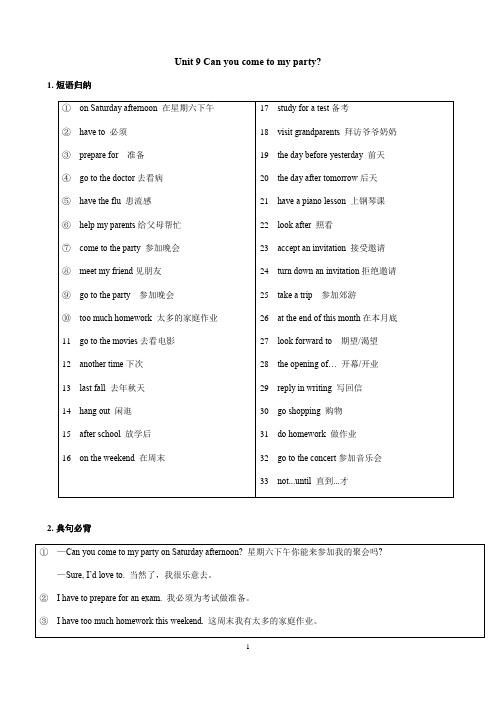
Unit 9 Can you come to my party?1.短语归纳2.典句必背3.用法集萃(1)—Can you come to my party on Saturday afternoon? 星期六下午你能来参加我的聚会吗?—Sure, I’d love to. 当然了,我很乐意去。
❖“Can you..?”可用来向别人发出邀请或询问对方能否做某事。
肯定答语是:Sure, I’d love to./Certainly./Of course, I can. 等。
否定答语常用:I’d love to, but I have to.../Sorry, I have to.../I’m sorry, I can’t. 等。
例:Can you go to the movies with me tonight? 今晚你能与我一起去看电影吗?Sure, I’d love to. 当然,我很乐意去。
(2)I have to prepare for an exam. 我必须为考试做准备。
❖prepare 意为“(为.....做准备;把....准备好”。
其用法如下:(3)I have too much homework this weekend. 这周末我有太多的家庭作业。
❖too much修饰不可数名词,用来强调其“量”超出了正常的范围。
too用来修饰形容词或副词,表示“太”的意思,其程度比very、so quite要强得多。
例:He sometimes finds his teacher leaves them too much homework to do.他有时发现老师留给他们做的家庭作业太多了。
I don’t want to eat too much food every day. 我不想每天吃太多的食物。
❖辨析(4)I remember we went bike riding together last fall when he visited you.我记得他去年秋天来拜访你的时候我们一起骑自行车兜风了。
英语八年级上册Unit 9重点知识及短语归纳
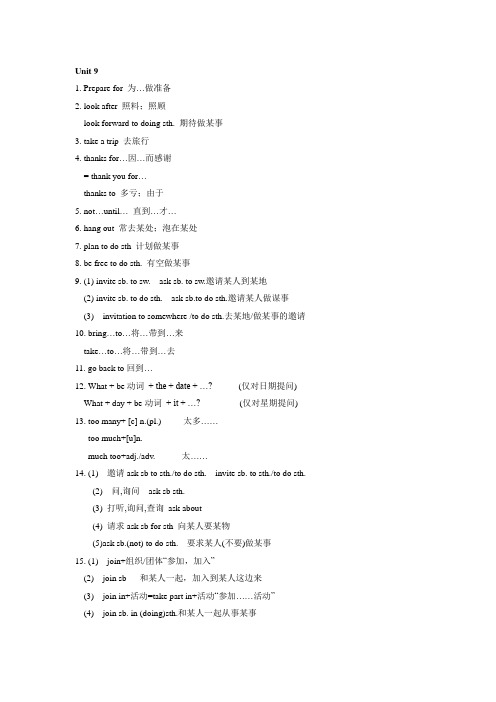
Unit 91. Prepare for 为…做准备2. look after 照料;照顾look forward to doing sth. 期待做某事3. take a trip 去旅行4. thanks for…因…而感谢= thank you for…thanks to 多亏;由于5. not…until…直到…才…6. hang out 常去某处;泡在某处7. plan to do sth 计划做某事8. be free to do sth. 有空做某事9. (1) invite sb. to sw.---ask sb. to sw.邀请某人到某地(2) invite sb. to do sth.---ask sb.to do sth.邀请某人做谋事(3) invitation to somewhere /to do sth.去某地/做某事的邀请10. bring…to…将…带到…来take…to…将…带到…去11. go back to回到…12. What + be动词+ the + date + …?(仅对日期提问) What + day + be动词+ it + …? (仅对星期提问) 13. too many+ [c] n.(pl.) 太多……too much+[u]n.much too+adj./adv. 太……14. (1) 邀请ask sb to sth./to do sth.---invite sb. to sth./to do sth.(2) 问,询问ask sb sth.(3) 打听,询问,查询ask about(4) 请求ask sb for sth 向某人要某物(5)ask sb.(not) to do sth. 要求某人(不要)做某事15. (1) join+组织/团体“参加,加入”(2) join sb 和某人一起,加入到某人这边来(3) join in+活动=take part in+活动“参加……活动”(4) join sb. in (doing)sth.和某人一起从事某事。
Unit 9【复习课件】八年级英语上册单元复习(人教版)
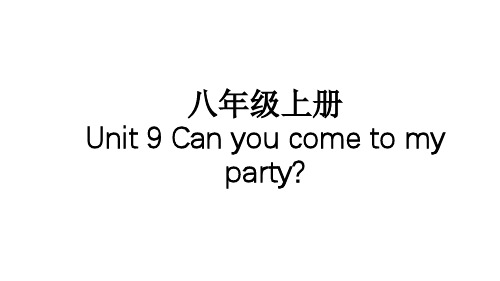
---____C_a_n__y_o_u__c_o_m__e_t_o_m_?y house on Sunday?
---____S__o_r_r_y_,_I’_m__n__o_t_a_v_a_i_la_b_l_e_._I_h_a?ve too much homework.
invitation /ˌɪnvɪ'teɪʃn/ n.邀请;请柬 turn down拒绝 reply /rɪ'plaɪ/ v.回答,回复 forward/'fɔː(r)wə(r)d/ v. 转交;发送,adv.向前,前进 delete /dɪ'liːt/ v.删除 print/prɪnt/ v.打印;印刷 sad /sæd/ adj.(令人)悲哀的/(令人)难过的 goodbye/ˌɡʊd'baɪ/ interj.&n.再见 take a trip去旅行 glad /ɡlæd/ adj.高兴;愿意 help out(帮助……)分担工作、解决难题 preparation /ˌprepə'reɪʃn/ n.准备,准备工作 glue /gluː/ n.胶水 without /wɪ'ðaʊt/prep.没有/不(做某事) surprised /sə(r) 'paɪzd/adj.惊奇的/感觉意外的
表推测
can’t 表不可能 could不确定推测
The red hat can’t be his, because his is black. He won’t do this. It could be wrong.
may表请求
语气委婉礼 貌
回答用 may/can
May I sit here?
部编版八年级英语上册Unit9Canyoucometomyparty知识点归纳超级精简版
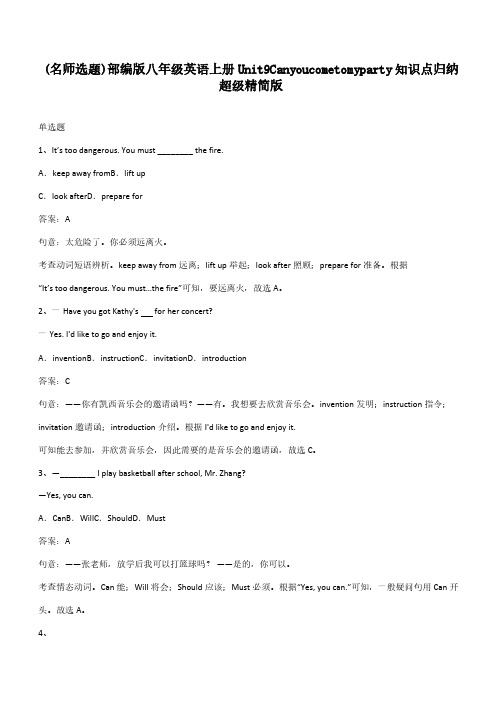
(名师选题)部编版八年级英语上册Unit9Canyoucometomyparty知识点归纳超级精简版单选题1、It’s too dangerous. You must ________ the fire.A.keep away fromB.lift upC.look afterD.prepare for答案:A句意:太危险了。
你必须远离火。
考查动词短语辨析。
keep away from远离;lift up举起;look after照顾;prepare for准备。
根据“It’s too dangerous. You must…the fire”可知,要远离火,故选A。
2、一Have you got Kathy's for her concert?一Yes. I'd like to go and enjoy it.A.inventionB.instructionC.invitationD.introduction答案:C句意:——你有凯西音乐会的邀请函吗?——有。
我想要去欣赏音乐会。
invention发明;instruction指令;invitation邀请函;introduction介绍。
根据I'd like to go and enjoy it.可知能去参加,并欣赏音乐会,因此需要的是音乐会的邀请函,故选C。
3、—________ I play basketball after school, Mr. Zhang?—Yes, you can.A.CanB.WillC.ShouldD.Must答案:A句意:——张老师,放学后我可以打篮球吗?——是的,你可以。
考查情态动词。
Can能;Will将会;Should应该;Must必须。
根据“Yes, you can.”可知,一般疑问句用Can开头。
故选A。
4、In Switzerland, keeping only one goldfish isn’t ________, because the government believes it is very bad to make such social animals live alone.A.stoppedB.doubtedC.refusedD.allowed答案:D句意:在瑞士,只养一条金鱼是不允许的,因为政府认为让这些群居动物独自生活是非常不好的。
八年级英语下册Unit9Haveyoueverbeentoamuseum知识汇总笔记(带答案)

八年级英语下册Unit9Haveyoueverbeentoamuseum知识汇总笔记单选题1、In fact he knows this place very well, for he ________ there three times.A.has beenB.has been toC.has goneD.has gone to答案:A句意:事实上他对这个地方非常熟悉,因为他去过那儿三次了。
考查现在完成时。
there是副词,前面不可加介词to,因此排除BD两项;又因为该句是说“他去过那儿”,所以用he has been there。
has/have gone to一般是表示某人去了某地,还没回来。
故选A。
2、Every year, _________ books are given away to the poor children in the countryside. A.thousandB.thousands ofC.thousand ofD.thousands答案:B句意:每年,成千上万的书被分发给农村的贫困儿童。
考查thousand的用法。
当thousand前有具体基数词时,表示确数,thousand后不加-s,也不加of;当thousand前没有具体基数词时,表示约数,thousand后既加-s,也要加of。
故选B。
3、______ visitors come to Gulangyu during May Day holiday every year.A.Thousands ofB.Two thousandsC.Thousand ofD.Thousand答案:A句意:每年在五一期间成千上万的游客来鼓浪屿。
thousand千,表示具体数时,与数词连用,不加s;表示约数时,与of连用,加s,thousands of成千上万,故选A。
4、Before you ask someone for help, find out he is the right person for your problem. A.sinceB.thatC.whetherD.unless答案:C句意:在你向别人寻求帮助前,先确定他是否是适合你的问题的人。
新人教版八年级英语上册复习短语笔记资料Unit 9 Can you come to my party
Unit 9 Can you come to my party?Section A1. make an invitation 提出邀请accept an invitation 接受邀请decline an invitation = say no to an invitation=refuse an invitation =turn down an invitation 拒绝邀请2. come to the party 来参加聚会go to a party去参加聚会3. prepare for sth. = get ready for sth.为某事做准备prepare to do sth. = get ready to do sth.准备做某事4. go to the doctor = go to hospital 去看病go to the dentist 去看牙医5. have the flu得流感(注意:只有流感用the, 其他病用a) have a cold 感冒have a stomachache 胃痛have a cough 嗓漱have a fever 发烧6. study for a math / an English test为数学/英语考试而学习7. be available 有空的be available for + n.对于……来说是可用的,可得到的be available to + n. / v.可被……利用或得到的be available to sb. 对某人来说可以使用的be available to do sth.自由自在做某事;有空去做某事8. much too + adj. 太......too much +不可数名词太多...... 9. another time其他时间;别的时间maybe another time = maybe next time也许下次10. thanks for (doing) sth.= thank sb. for (doing) sth. 感谢某人做某事thanks for asking 多谢邀请11. go bike riding骑自行车旅行;骑自行车兜风12. last fall = last autumn去年秋天;去年秋季13. have an exam = take an exam(学生)参加考试hold an exam = give an exam (老师)举行考试have a rest = take a rest 休息have a look = take a look 看一看14. not…until / till...直到......才......15. hang out闲逛;常去某处hang up挂断电话;悬挂16. on Monday night = on the night of Monday 在星期一晚上on Wednesday afternoon= on the afternoon of Wednesday在星期三下午17. Catch you on Monday!=See you on Monday! 礼拜一见!Catch you later! = See you later! 回头见!18. invite sb. to do sth.邀请某人去做某事be invited to do sth.被邀请做某事invite sb. to sp.邀请某人到某处invite sb. to (have) dinner 邀请某人吃饭19. refuse to do sth. 拒绝做某事Section B20. the day after tomorrow 后天the day before yesterday 前天the year before last year 前年last year 去年this year 今年next year 明年the year after next year 后年21. have a piano lesson 上钢琴课22. on weekdays = from Monday to Friday在工作日on weekends 在周末this weekend这个周末last weekend上个周末next weekend下个周末23. look after = take care of 照顾;照料look after sb. well = take good care of sb.好好照顾;好好照料24. help sb. with sth. = help sb. (to) do sth.帮助某人做某事with one ’ s help = with the help of sb.在某人的帮助之下help out (with sth.)帮助摆脱困境/克服困难help sb. out帮助某人解决问题或摆脱困境25. see sb. do sth.看到某人做了某事(强调看见某人做过某事)see sb. doing sth.看到某人正在做某事(强调看见某人正在做某事)26. take a trip = go on / for a trip 去旅行take a trip to sp. = go to sp. for a trip到某地去旅行27. at the end of... 在......的末端;在......的尽头at the end of this month 在这个月月底at the end of the road 在路的尽头28. be glad / happy to do sth.很高兴做某事29. by +时间点到......为止by now到现在为止by this Friday到这个星期五之前为止30. be surprised 感到惊讶be surprised at sth.对某事感到很惊讶be surprised to do sth.惊讶地做某事31. think of想出;想起;认为think about考虑;思考think over好好考虑;深思熟虑32. bring sb. / sth. to sp. 带某人/某物到某地33. so that 为了;以便34. look forward to doing sth.期待做某事;盼望做某事35. hear from sb. = get / receive a letter from sb. 收到某人的来信hear about / of sth. / sb. 听说某事/某人36. plan a housewarming party策划一个乔迁聚会plan a party for sb.为某人策划一个聚会have a surprise party办一场惊喜聚会;开惊喜聚会at the party在聚会上37. make it成功;胜利(表示通过努力或经历困难后取得成功、完成某事)38. reply in writing以书面的形式进行回复reply to these letters回复这些来信reply to the question=make a reply to the question=answer the question 回答问题39. go to a concert去听音乐会give a concert开音乐会40. go to the movies = go to see a film=go to the cinema 去看电影。
人教版八年级上册英语-Unit-9单元知识点总结
Unit 9 Can you come to my party? 情态动词定义: 说话人对某一动作或状态的态度情态动词有一定的词义must 必须can/could 能,会may/might 可以need 需要should 应该would 愿,要have to 不得不情态动词不能单独做谓语——情态动词+do情态动词没有人称,数的变化基本句型:肯定句:主语+情态动词+do+......否定句:主语+情态动词+not+do+......疑问句:情态动词+主语+do+......用法Can 和 could 的用法:表能力、许可、可能性表示能力时一般译为“能、会”例:She can swim fast, but I can’t.她能游得很快,但我不能I can see with my eyes. 我用眼睛看be able to do sth. 常常指经过努力,花费了时间和劳力之后才能做到某事表推测,可能性可能常用于否定句和疑问句中can’t不可能例:Can the news be true? 这个消息会是真的吗?—Can it be our teacher? 那个人有可能是我们老师吗?—No, it can’t be our teacher. He is on a visit to the Great Wall.could 在疑问句中,表示委婉的语气,此时could 没有过去式的意思例:—Could I use your pen? 我能用一下你的钢笔吗?—Yes, you can.可以(用 could 问,不能用 could 答。
)may 和 might 的用法表请求、许可,比 can 正式例:May I borrow your bike? 我可以借你的自行车吗?You may go home now. 现在你可以回家了表推测,谈论可能性可能,或许一般用于肯定句中may not 翻译为“可能不”例:It may rain tomorrow. 明天可能会下雨She may be at home. 她可能在家呢may 的过去式为 might ,表示推测时。
八年级英语u9知识点
八年级英语u9知识点
八年级英语的Unit 9主要介绍了一些有关于交通出行和交通规则的内容。
这里将会介绍这个单元的主要知识点。
一、交通工具
在这个单元,我们学习了一些不同的交通工具和它们的特点。
例如,汽车、公共汽车、自行车、船和飞机等。
我们需要了解它们的主要结构、基本用途以及输送方式等。
二、方向和位置
当我们询问某个地点的方向或给出某个地方的方向时,我们需要使用卡片词。
例如,在右边,左边,直走,往前,往后等。
我们也学习了一些关于位置的词汇,如前面、后面、中间、旁边和对面等。
三、询问和给出信息
在交通出行中,询问方向、地点和其他相关信息非常重要。
因此,在这个单元,我们学习了一些有关如何有效地进行信息交流
的语言表达方法。
例如,如何向他人提问和回答问题,如何描述
位置,如何提供和请求帮助等。
四、指示词和冠词
在描述交通工具、位置和方向时,我们需要使用指示词和冠词。
这些词语能够帮助我们更清楚地表达意思,如this、that、these、those、a、an和the等。
五、交通规则
学习关于交通规则是出现意外事故和确保人身安全的关键。
在
这个单元里,我们学习了一些常见的交通规则,如穿过马路时如
何确保自己的安全,如何识别交通标记等等。
总结
通过学习这个单元,我们可以更好地了解有关交通出行及其相关信息的表达方法,同时学习了如何提供和请求帮助,如何保障自己的人身安全以及关于交通规则的知识。
这些知识点不仅适用于英语学习,也将对我们的日常生活有所帮助。
八年级英语上册Unit9Canyouetomyparty知识点归纳(新版)
Unit9 Can you e to my party?短语:1.on Saturday afternoon在周六下午2.prepare for为……做准备prepare to do sth 准备做某事3.go to the doctor去看医生4.have the flu患感冒5.help my parents帮助我的父母6.e to the party来参加聚会7.meet my friend会见我的朋友8..another time其他时间st fall=last autumn去年秋天10.go to the party去聚会11.hang out with sb 和某人一起闲逛12.the day after tomorrow后天the day before yesterday前天13.have a piano lesson上钢琴课14.accept an invitaton接受邀请14.turn down an invitation拒绝邀请15.look for寻找look after=take care of照顾16.take a trip去旅行17 at the end of this month这个月末 18.lookforward to doing盼望;期待19.the opening of… ……的开幕式/落成典礼 20.reply in writing书面回复21.go to the concert去听音乐会not…until直到……才22.too much homework太多作业do homework做家庭作业23.after school放学后24.help out分担工作,解决难题25,hear from sb 收到某人的来信26.any of the party preparations派对准备中的任何事用法:1.invite sb. to do sth.邀请某人做某事invite sb to sp 邀请某人去某地2.what引导的感叹句结构:What+a/an+adj.+可数名词单数(+主语+谓语)!What+adj.+名词复数/不可数名词(+主语+谓语)!5.see sb. do sth. see sb.doing sth.10.What’s today?今天是什么日子?What’s the date today?今天几号?What day is it today?今天星期几?11.Thanks for asking= Thanks for inviting = Thanks for your invitantion谢谢你的邀请12.refuse to do sth 拒绝做某事。
- 1、下载文档前请自行甄别文档内容的完整性,平台不提供额外的编辑、内容补充、找答案等附加服务。
- 2、"仅部分预览"的文档,不可在线预览部分如存在完整性等问题,可反馈申请退款(可完整预览的文档不适用该条件!)。
- 3、如文档侵犯您的权益,请联系客服反馈,我们会尽快为您处理(人工客服工作时间:9:00-18:30)。
Unit 9 Can you come to my party?
重点词汇
名词:exam考试;flu流行性感冒,流感;weekday工作日(星期一至星期五的任何一天);invitation邀请,请柬;preparation准备,准备工作;glue胶水;housewarming乔迁聚会;opening开幕式,落成典礼;concert音乐会,演奏会;headmaster校长;event大事,公开活动,比赛项目;guest客人,宾客;calendar 日历,日程表;daytime白天,日间
动词:prepare使做好准备,把……准备好;hang悬挂,垂下;catch及时赶上,接住,抓住;invite邀请;accept接受;refuse拒绝;reply回答,回复;delete 删除;print打印,印刷
形容词:available有空的,可获得的;sad(令人)悲哀的,(令人)难过的;glad 高兴,愿意;surprised惊奇的,感觉意外的
介词:without 没有,不(做某事)
重点短语
1. Prepare for an exam/study for a test为考试做准备
2. go to the doctor去看医生
3. have the flu 患流感
4. thanks for doing 感谢做…
5. go bike riding去骑自行车
6. not …..until直到…才
7. hang out闲逛
8. look after照顾
9. turn down 拒绝
10. take a trip to 去…旅游
11. at the end of 在…结束的时候
12. help out 帮助某人排忧解难
13. leave for出发去…
14. by now 到目前为止
15. so that 以便;为了
16. look forward to doing 盼望做某事
17. hear from sb收到某人的来信
18. would like to do 愿意做某事
19. reply in writing以书面形式回复
20. what…for=why为什么
21. on the morning of 在某天的早晨
22. go to the concert去听音乐会
23. on Saturday afternoon 在周六下午
24. have to 必须;不得不
25. too much homework 太多作业
26. last fall 去年秋天
27. the day before yesterday 前天
28. the day after tomorrow 后天
29. look after照顾
30. have piano lessons上钢琴课
31. accept an invitation 接受邀请;turn down an invitation拒绝邀请
32.at the beginning/end of this month 在这个月初/末
33. reply to sth/sb. 回复
34. prepare for为……做准备
35. another time其他时间;别的时间
36. invite sb. to do sth. 邀请某人做某事
37. see sb do sth / see sb doing sth 看见某人做某事/看见某人正在做某事知识点
1.感叹句
What + a/an + 形容词+ 可数名词单数+ 主语+ 谓语!
What a nice present it is!它是一件多么好的礼物啊!
What an interesting book it is!它是一本多么有趣的书啊!
What + 形容词+ 名词复数/不可数名词(+ 主语+ 谓语)!
What beautiful flowers they are! 多么漂亮的花啊!
What good children they are! 他们是多么好的孩子啊!
What fine weather it is today! 今天天气多好啊!
What important news it is! 多重要的新闻啊!
How+形容词/ 副词+主语+谓语!
How careful she is! 她多么细心啊!
How fast he runs! 他跑得多快啊!
How+形容词+a/an +可数名词单数+主语+谓语!
How beautiful a girl she is!她是个多么漂亮的姑娘啊!
How+主语+谓语!How time flies!光阴似箭!
由what 引导的感叹句与由how 引导的感叹句有时可以转换,但句中部分单词的顺序要有所变化。
How beautiful a girl she is! =What a beautiful girl she is!
What delicious cakes these are! =How delicious these cakes are!
有时感叹句也可以由一个单词、词组、祈使句、陈述句等构成。
Good idea! 好主意!wonderful! 太精彩了!Thank goodness! 谢天谢地!
2. prepare“准备”,强调准备的动作与过程。
其后也可接双宾语,还可接不定式。
prepare for sth. 为…准备好。
for的宾语不是动作的承受者,而是表示准备的目的,即所要应付的情况。
prepare to do sth 准备做某事。
get/be ready“准备好”,强调准备的结果。
常见结构有:①be ready(for sth.)
②get sth. ready ③be ready(for sth) ④be get ready to do 准备干某事
3. have the flu /have a cold / catch a cold 感冒;have a cough 咳嗽;have a fever 发烧;have a sore throat 喉咙痛;have a headache头痛;have a toothache牙痛
4. hang out / about闲逛;hang on 紧紧抓住;hang up挂电话,悬挂,挂起
5. catch sb’s eye引起某人注意;catch the train赶上火车;catch up with赶上,跟上;catch hold of 抓住
6 .accept 接受, 反义词为:refuse。
accept指主观上愿意接受,receive 收到,指客观上收到或拿到,但主观上不一定会接受。
I received his gift yesterday, but I wouldn’t like to accept it.
我昨天收到了他的礼物,但我不会接受它。
7. turn down = refuse 拒绝;turn up 放大,调高;turn over 翻身;take turns 依次,轮流
8. help sb.(to) do sth 帮助某人做某事;help sb. with sth 在某方面帮助人;help oneself to sth 随便吃
9. at the end of 在…尽头;by the end of到…末为止;in the end of 最后,终于
10. surprised形容词,感到意外的,主语是人
be surprised to do sth 对做某事感到意外
surprising形容词,令人惊讶的,主语是物The news was surpring.
surprise名词,惊奇、惊讶to one’s surprise
动词,使惊奇,使感到意外It surprise sb to do sth.
10. look forward to 期待,盼望,to 是介词,后跟名词,代词或动名词作宾语。
hear from sb. 收到某人的来信= receive a letter from sb.
hear of = hear about 听说
11. make it①在约定的时间内到达,能够来= arrive in time;
Glad you could make it. 很高兴你能来。
②商量确定的时间,表示将来某项计划的安排,后接时间状语。
Let’s make it at seven o’clock on Tuesday.
③成功办成某事= succeed After years of hard work, he finally made it.
12. reply回答,指用口头或书面形式回答,不及物动词
reply to sb/sth. 对…..作出回答。
作及物动词,意为回答,回答说。
作名词,意为:答道,回信,答复,后跟介词to .
answer是最普通的用语,包括口头,书面或行动的回答,可作及物和不及物动词。
